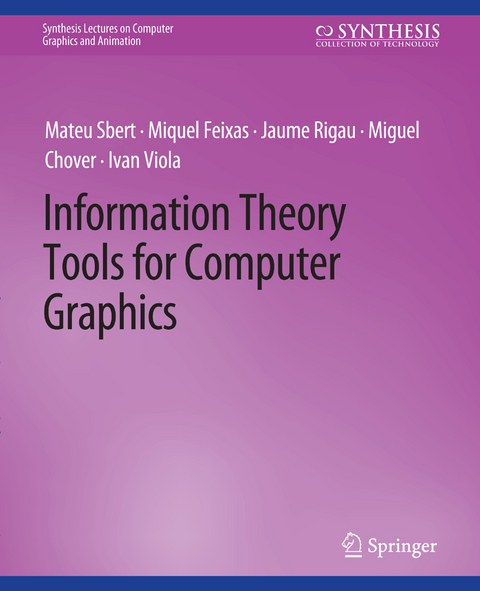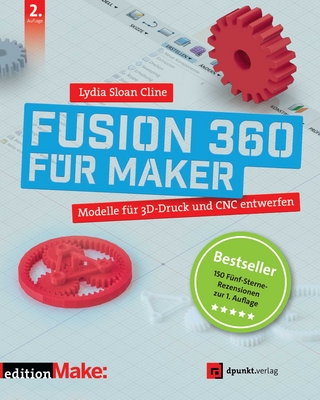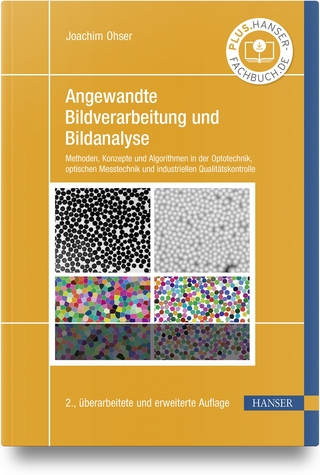
Information Theory Tools for Computer Graphics
Springer International Publishing (Verlag)
978-3-031-79545-9 (ISBN)
Mateu Sbert is a professor in Computer Science at the University of Girona, Spain. He received an M.Sc. in Theoretical Physics (1977) at the University of Valencia, an M.Sc.in Mathematics (Statistics and Operations Research, 1983) at U.N.E.D. University (Madrid), and a Ph.D. in Computer Science at the U.P.C. (Universitat Politecnica de Catalunya, 1997, Best Ph.D. Award). Mateu Sbert's research interests include the application of Monte Carlo and Information Theory techniques to Computer Graphics and Image Processing. He has authored or co-authored more than one hundred and fifty papers in his areas of research, served as a member of program committee in Spanish and international conferences,and participated in several European and Spanish research projects, leading the VIth European Framework Gametools project. Mateu Sbert coorganized the Dagsthul Seminars "Stochastic Methods in Rendering" and "Computational Aesthetics in Graphics, Visualization and Imaging." Miquel Feixas is an associate professor in Computer Science at the University of Girona, Spain. He received an M.Sc. in Theoretical Physics (1979) at the UAB (Universitat Autonoma de Barcelona) and a Ph.D. in Computer Science at the UPC (Universitat Politecnica de Catalunya, 2002). His research is focused on the application of Information Theory techniques to Radiosity, Global Illumination, Viewpoint Selection, Scientific Visualization, Image Processing, Medical Imaging, and Computational Aesthetics. He has authored or co-authored more than fifty papers in his areas of research. He acted as a reviewer for conferences in the field of computer graphics and image processing. He has participated in several European and Spanish research projects. Jaume Rigau is an associate professor in Computer Science at the University of Girona (UdG,Spain). He received an M.Sc. in Computer Science and a Ph.D. at the Technical University of Catalonia (UPC, Spain). His research is focused on the application of Information Theory to Computer Graphics and Image Processing. He has co-authored several papers in these areas of research and participated in European research projects and joint actions. Miguel Chover is an Associate Professor at the Universitat Jaume I de Castellon, Spain. His research focuses on interactive computer graphics, computer games, and Web3D. His current work includes level of detail modelling, simplification algorithms, rendering natural phenomena, and texturing techniques. He received his M.Sc. degree in Computer Science in 1992 and a Ph.D. in Computer Science in 1996 from the Universidad Politecnica de Valencia, Spain. He is member of Eurographics. Ivan Viola is an Associate Professor at University of Bergen, and a scientific adviser at Christian Michelsen Research (CMR), Bergen, Norway. He received an M.Sc. in 2002 and Ph.D. in 2005 from Vienna University of Technology, Austria. His research is focused on application of illustrative visualization for communication of complex scientific data.Viola co-authored several scientific works published in international journals and conferences such as IEEE TVCG, IEEE Visualization, and EuroVis and acted as a reviewer and IPC member for conferences in the field of computer graphics and visualization (e.g., IPC IEEE Visualization 2009, EuroVis 2009). He is member of Eurographics, NorSIGD, IEEE Computer Society, VGTC.
Information Theory Basics.- Scene Complexity and Refinement Criteria for Radiosity.- Shape Descriptors.- Refinement Criteria for Ray-Tracing.- Viewpoint Selection and Mesh Saliency.- View Selection in Scientific Visualization.- Viewpoint-based Geometry Simplification.
| Erscheinungsdatum | 06.06.2022 |
|---|---|
| Reihe/Serie | Synthesis Lectures on Computer Graphics and Animation | Synthesis Lectures on Visual Computing: Computer Graphics, Animation, Computational Photography and Imaging |
| Zusatzinfo | XII, 153 p. |
| Verlagsort | Cham |
| Sprache | englisch |
| Maße | 191 x 235 mm |
| Gewicht | 329 g |
| Themenwelt | Informatik ► Grafik / Design ► Digitale Bildverarbeitung |
| Informatik ► Theorie / Studium ► Künstliche Intelligenz / Robotik | |
| Mathematik / Informatik ► Mathematik | |
| ISBN-10 | 3-031-79545-8 / 3031795458 |
| ISBN-13 | 978-3-031-79545-9 / 9783031795459 |
| Zustand | Neuware |
| Haben Sie eine Frage zum Produkt? |
aus dem Bereich


